June 22 to June 28 - abbey
Main menu:
- Home Page
- Abbey
- Apiary
- Documents
- Monastic
- Spirituality
- Apostleship of the Sea
- Homilies of Pope Francis
June 22 to June 28
Serve the Word of God, not the idolatry of riches
The riches and the cares of the world ‘choke the Word of God’, said Pope Francis at Mass on Saturday 22 June morning. The Pope pointed out that our life is set on three pillars: election, covenant, and promise, adding that we must trust the Father in living in the present without worrying about what will happen.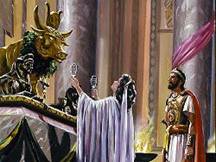 Pope Francis began his reflection on focusing on the day’s gospel which centred on the theme of riches and cares, and where Jesus, says “No one can serve two masters.” The riches and cares of the world that choke the Word of God, are the thorns spoken of in the Parable of the Sower. Our life is founded on three pillars: the past, the present and the future. The pillar of the past, is that of the election of the Lord. Every one of us can say “the Lord has chosen me, has loved me,” “He has said to me ‘come’,” and with Baptism “he has chosen me to go along a road, the Christian road.” The future, on the other hand, concerns “walking towards a promise”, the Lord has made us a promise. Finally, the present “is our response to the God Who is so good that He has chosen me. He makes a promise, he proposes a covenant with me, and I make a covenant with Him.
Pope Francis began his reflection on focusing on the day’s gospel which centred on the theme of riches and cares, and where Jesus, says “No one can serve two masters.” The riches and cares of the world that choke the Word of God, are the thorns spoken of in the Parable of the Sower. Our life is founded on three pillars: the past, the present and the future. The pillar of the past, is that of the election of the Lord. Every one of us can say “the Lord has chosen me, has loved me,” “He has said to me ‘come’,” and with Baptism “he has chosen me to go along a road, the Christian road.” The future, on the other hand, concerns “walking towards a promise”, the Lord has made us a promise. Finally, the present “is our response to the God Who is so good that He has chosen me. He makes a promise, he proposes a covenant with me, and I make a covenant with Him.
The three pillars of salvation are election, covenant, and promise. But when our heart enters into what Jesus explains to us, it takes away time: it takes away the past, it takes away the future, and one is confused in the present. For one who is attached to riches, neither the past nor the future is important; he has everything here. Wealth is an idol. I don’t need a past, a promise, an election: Nothing. He who is worried about what will happen, takes away his relation with the future – but can one do this? – and the future becomes futuristic, but no, it doesn’t direct you to any promise: you remain confused, you remain alone.” Riches and cares, are the two things that make us forget our past, that make us live as if we didn’t have a Father. And even our present is a present that doesn’t work. Forgetting the past, not accepting the present, disfigure the future: that’s what riches and cares do. The Lord tells us: “But be calm! Seek the Kingdom of God, and everything else will come.” Let us ask the Lord for the grace not to fool ourselves with worries, with the idolatry of riches, and to always remember that we have a Father Who has chosen us; to remember that this Father promises us a good thing, which is walking towards that promise; and having courage to take the present as it comes. Let us ask this grace from the Lord.”
Riches and cares, are the two things that make us forget our past, that make us live as if we didn’t have a Father. And even our present is a present that doesn’t work. Forgetting the past, not accepting the present, disfigure the future: that’s what riches and cares do. The Lord tells us: “But be calm! Seek the Kingdom of God, and everything else will come.” Let us ask the Lord for the grace not to fool ourselves with worries, with the idolatry of riches, and to always remember that we have a Father Who has chosen us; to remember that this Father promises us a good thing, which is walking towards that promise; and having courage to take the present as it comes. Let us ask this grace from the Lord.”
Respond to Jesus from the heart
Sunday June 23, morning, Pope Francis celebrated mass at the Domus Sanctae Marthae. About 40 apostolic nuncios, who remained in the Vatican after the Pope’s meeting with them on Friday, were present. Commenting on the Sunday Gospel from Luke, in which Jesus asks the Apostles, “But who do you say that I am?”, the Pope underlined that we need to respond to Jesus from the heart, inspired by our veneration for him and from the rock of his love.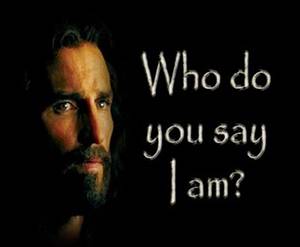 In Luke, Jesus asks: “But who do you say that I am?” And Peter responds: “The Christ of God”. The question that Jesus asks in the Gospel of Luke is relevant to us 2,000 years later and cuts straight to the heart to which we must respond with the humility of a sinner, beyond all ready-
In Luke, Jesus asks: “But who do you say that I am?” And Peter responds: “The Christ of God”. The question that Jesus asks in the Gospel of Luke is relevant to us 2,000 years later and cuts straight to the heart to which we must respond with the humility of a sinner, beyond all ready-
We, even we, who are apostles and servants of the Lord need to respond because the Lord asks us: ‘What do you think of me?’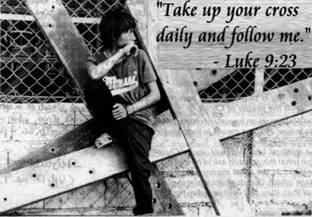 “Veneration and love for his Holy Name. Certainty that he set us on a rock – the rock of his love. And from this love, we give you the answer, we give the answer. And when Jesus asks these questions – ‘Who am I for you?’ – we need to think of this: I was set on the rock of his love. He leads me. I must respond firmly on that rock and under his leadership. “Who am I for you?” Jesus asks us. Sometimes we are ashamed to respond to his question, because we know that something in us is not right, we are sinners. But it is exactly in this moment that we should trust in his love and respond with that sense of truth, as Peter did on Lake Tabor: “Lord, you know everything”. It is exactly in the moment that we feel like sinners, the Lord loves us a lot, and just as he put Peter, the fisherman, at the head of his Church, so, too, will the Lord do something good with us.
“Veneration and love for his Holy Name. Certainty that he set us on a rock – the rock of his love. And from this love, we give you the answer, we give the answer. And when Jesus asks these questions – ‘Who am I for you?’ – we need to think of this: I was set on the rock of his love. He leads me. I must respond firmly on that rock and under his leadership. “Who am I for you?” Jesus asks us. Sometimes we are ashamed to respond to his question, because we know that something in us is not right, we are sinners. But it is exactly in this moment that we should trust in his love and respond with that sense of truth, as Peter did on Lake Tabor: “Lord, you know everything”. It is exactly in the moment that we feel like sinners, the Lord loves us a lot, and just as he put Peter, the fisherman, at the head of his Church, so, too, will the Lord do something good with us.
He is the greatest, he is the greatest! And when we say, from veneration and from love, secure, secure on the rock of his love and guidance: ‘You are the anointed one’, this will do us much good and it will make us move forward with certainty and pick up the cross daily, which is heavy at times. Let us go forward like this, with joy, and asking for this grace: grant to your people, Father, to always live in veneration and love for your Holy Name! And with the certainty that you never deprive of your guidance those whom you have set on the rock of your love!”
John the Baptist a model for the Church
The church exists for courageously proclaiming -
The figure of John the Baptist, is not always easy to understand. When we think of his life we think of a prophet, a man who was great and then ends up as a poor man. Who is John? John himself explains "I am a voice, a voice in the wilderness," but it is a voice without the Word, because the Word is not him, it is an Other. Here then is the mystery of John: He never takes over the Word, John is the one who indicates, who marks. The meaning of John's life is to indicate another. I am struck by the fact that the Church chooses to mark John’s feast day at a time when the days are at their longest in the year, when they have more light. And John really was the man of light, he brought light, but it was not his own light, it was a reflected light. John is like a moon and when Jesus began to preach, the light of John began to decline, to set. ‘Voice’ not ‘Word’ - John seems to be nothing. That is John’s vocation: he negates himself. And when we contemplate the life of this man, so great, so powerful -
John seems to be nothing. That is John’s vocation: he negates himself. And when we contemplate the life of this man, so great, so powerful -
The Church exists to proclaim, to be the voice of a Word, her husband, who is the Word. The Church exists to proclaim this Word until martyrdom. Martyrdom, precisely in the hands of the proud, the proudest of the Earth. John could have made himself important, he could have said something about himself. 'But I never think', only this: he indicated, he felt himself to be the voice, not the Word. This is John’s secret. Why is John holy and without sin? Because he never, never took a truth as his own. He would not be an ideologue. The man who negated himself so that the Word could come to the fore. And we, as a Church, we can now ask for the grace not to become an ideological Church ... The Church, must hear the Word of Jesus and raise her voice, proclaim it boldly. That is the Church without ideologies, without a life of its own: the Church which is the mysterium lunae which has light from her Bridegroom and diminish herself so that He may grow"
This is the model that John offers us today, for us and for the Church, that is always at the service of the Word. A Church that never takes anything for herself. Today in prayer we ask for the grace of joy, we ask the Lord to cheer this Church in her service to the Word, to be the voice of this Word, preach this Word. We ask for the grace, the dignity of John, with no ideas of their own, without a Gospel taken as property, only one Church that indicates the Word, and this even to martyrdom.
To be Christian is a response to the voice of love
This was the central theme of the Pope Francis homily for Mass on Tuesday June 25. He spoke of the Christian certainty that God never leaves us alone and asks us to go forward, even in the midst of difficulties.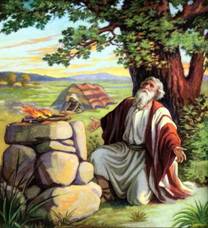 His homily focused on the first reading of the day, from the Book of Genesis, which tells of the discussion between Abram and Lot his cousin for the division of the earth. Abram, the Pope observed, “keeps walking” left his land to go, he knew not where, but wherever the Lord would tell him. He kept on walking, then, because he believed in the Word of God, which had invited him to go out of his land. This man, perhaps ninety years old, looked upon the land that the Lord had shown him. His entire journey is going toward this promise. The way he walked his path is a model for how we [ought to walk our own]. God called Abram, a [single] person, and that one person makes an entire people. God always speaks to us singularly, because He has created us in his image and likeness. He spoke to Abram and gave him a promise and invited him to come out of his land. We, Christians have been called one-
His homily focused on the first reading of the day, from the Book of Genesis, which tells of the discussion between Abram and Lot his cousin for the division of the earth. Abram, the Pope observed, “keeps walking” left his land to go, he knew not where, but wherever the Lord would tell him. He kept on walking, then, because he believed in the Word of God, which had invited him to go out of his land. This man, perhaps ninety years old, looked upon the land that the Lord had shown him. His entire journey is going toward this promise. The way he walked his path is a model for how we [ought to walk our own]. God called Abram, a [single] person, and that one person makes an entire people. God always speaks to us singularly, because He has created us in his image and likeness. He spoke to Abram and gave him a promise and invited him to come out of his land. We, Christians have been called one-
There is a call, by name, and with a promise, go ahead, I am with you! I walk beside you.
"Someone will say, ‘Father, I am a sinner’, but we all are, as everyone knows. The problem is: sinners, go forward with the Lord, go forward with that promise that He has made us, with the promise of fruitfulness, and tell others, recount to others that the Lord is with us, that the Lord has chosen us and that He does not leave us alone, not ever!
May the Lord give us, this desire to move forward, which Abram had, in the midst of all his problems: to go forward with the confidence that He who called me, who promised me so many beautiful things, is with me.”
Priests must ask God's grace to be good spiritual fathers.
The desire to be a father is ingrained in all men, even priests, who are called to give life, care, protection to their spiritual children entrusted to them. Fatherhood and the spiritual paternity of priests was the main focus of Pope Francis’ homily during Mass on Wednesday, June 26. The Mass was concelebrated by the Cardinal Archbishop Emeritus of Palermo, Salvatore De Giorgi, who was celebrating the 60th anniversary of his priestly ordination. "When a man does not have this desire, something is missing in this man. Something is wrong. All of us, to exist, to become complete, in order to be mature, we need to feel the joy of fatherhood: even those of us who are celibate. Fatherhood is giving life to others, giving life, giving life… For us, it is pastoral paternity, spiritual fatherhood, but this is still giving life, this is still becoming fathers. "
"When a man does not have this desire, something is missing in this man. Something is wrong. All of us, to exist, to become complete, in order to be mature, we need to feel the joy of fatherhood: even those of us who are celibate. Fatherhood is giving life to others, giving life, giving life… For us, it is pastoral paternity, spiritual fatherhood, but this is still giving life, this is still becoming fathers. "
Pope Francis was inspired by the first reading of the day from Genesis, in which God promises an elderly Abram the joy of a child, along with descendants as numerous as the stars of heaven. To seal this covenant, Abram follows God's directions and prepares a sacrifice of animals which he then defends from attack by birds of prey. The Pope said, ‘It moves me to picture this ninety year old man with a stick in his hand, defending his sacrifice. It makes me to think of a father defending his family, his children.’
"A father is one who knows what it means to protect his children. And this is a grace that we priests must ask for ourselves: to be a father, to be a father. The grace of fatherhood, of pastoral paternity, of spiritual paternity. We may have many sins, but this is commune sanctorum: We all have sins. But not having children, never becoming a father, it like an incomplete life: a life that stops half way. And therefore we have to be fathers. But it is a grace that the Lord gives. People say to us: 'Father, Father, Father ...'. They want us to be this, fathers, by the grace of pastoral fatherhood. "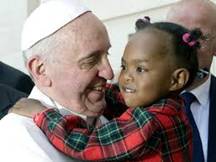 Pope Francis then turned to Cardinal De Giorgi, who was marking the 60th anniversary of his priestly ordination. ‘I do not know what our dear Salvatore did, but I'm sure that he was a father. And this is a sign, the Pope said pointing to the many priests who accompanied the cardinal. “Now it's up to you” every tree "bears its own fruit, and if it is good, the fruit must be good, right?"
Pope Francis then turned to Cardinal De Giorgi, who was marking the 60th anniversary of his priestly ordination. ‘I do not know what our dear Salvatore did, but I'm sure that he was a father. And this is a sign, the Pope said pointing to the many priests who accompanied the cardinal. “Now it's up to you” every tree "bears its own fruit, and if it is good, the fruit must be good, right?"
The desire of fatherhood is written in the very fibre of every man, and for a priest it is not different, even if his desire is oriented to live in a particular way – to look after the flock entrusted to his care. Let us ask God for the grace for men to be good fathers and for priests to be good pastoral fathers.
Resting our faith on the rock of Christ
There are people who "masquerade as Christians," and sin by being excessively superficial or overly rigid, forgetting that a true Christian is a person of joy who rests their faith on the rock of Christ. Some think they can be Christian without Christ; others think being Christian means being in a perpetual state of mourning. This was the focus of Pope Francis’ homily at morning Mass on Thursday 27th June.
Rigid and sad. Or happy but with no idea of Christian joy. These are two - "In the history of the Church there have been two classes of Christians: Christians of words -
"In the history of the Church there have been two classes of Christians: Christians of words -
He went on analyzing these "Christians of words," revealing their specific characteristics. There is a first type – which he defined as "gnostic -
"And this temptation exists today. Superficial Christians, who believe, yes, God, yes Christ, but not ‘everywhere’: Jesus Christ is not the one who gives them their foundation. They are the modern gnostics. On the other hand, there are those who believe that the Christian life should be taken so seriously that they end up confusing solidity, firmness, with rigidity. They are rigid! They think that being Christian means being in perpetual mourning. He continued that the fact is that there “are so many” of these Christians. who disguise themselves as Christians." "The former have a ‘superficial’ happiness. The others live in perpetual state of mourning, but do not know what Christian joy is. They do not know how to enjoy the life that Jesus gives us. And they not only have no joy, they have no freedom either. They are the slaves of superficiality. The Holy Spirit has no place in their lives. It is the Spirit who gives us the freedom! Today, the Lord calls us to build our Christian life on Him, the rock, the One who gives us freedom, the One who sends us the Spirit that keeps us going with joy, on His journey, following His proposals."
"The former have a ‘superficial’ happiness. The others live in perpetual state of mourning, but do not know what Christian joy is. They do not know how to enjoy the life that Jesus gives us. And they not only have no joy, they have no freedom either. They are the slaves of superficiality. The Holy Spirit has no place in their lives. It is the Spirit who gives us the freedom! Today, the Lord calls us to build our Christian life on Him, the rock, the One who gives us freedom, the One who sends us the Spirit that keeps us going with joy, on His journey, following His proposals."
The Mystery of God’s patience
The Lord asks us to be patient, after all He is always patient with us. Moreover there is no "set protocol" for how God intervenes in our lives; sometimes it's immediate, sometimes we just have to have a little patience. This was the lesson drawn by Pope Francis from the daily readings at Mass Friday June 28.
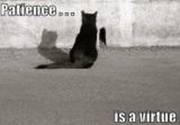 The Lord slowly enters the life of Abraham, who is 99 years old when He promises him a son. Instead He immediately enters the life of the leper, Jesus listens to his prayer, touches him and preforms a miracle. Pope Francis went on to speak of how the Lord chooses to become involved in our lives, in the lives of His people. The lives of Abraham and the leper. When the Lord intervenes He does not always do so in the same way. There is no ‘set protocol’ of action of God in our life, it does not exist. Once, He intervenes in one way, another time in a different way but He always intervenes. There is always this meeting between us and the Lord.
The Lord slowly enters the life of Abraham, who is 99 years old when He promises him a son. Instead He immediately enters the life of the leper, Jesus listens to his prayer, touches him and preforms a miracle. Pope Francis went on to speak of how the Lord chooses to become involved in our lives, in the lives of His people. The lives of Abraham and the leper. When the Lord intervenes He does not always do so in the same way. There is no ‘set protocol’ of action of God in our life, it does not exist. Once, He intervenes in one way, another time in a different way but He always intervenes. There is always this meeting between us and the Lord.
"The Lord always chooses His way to enter into our lives. Often He does so slowly, so much so, we are in danger of losing our 'patience', a little. But Lord, when? 'And we pray, we pray ... And He doesn’t intervene in our lives. Other times, when we think of what the Lord has promised us, that it such a huge thing, we don’t believe it, we are a little skeptical, like Abraham – and we smile a little to ourselves ... This is what it says in the First Reading, Abraham hid his face and smiled ... A bit 'of skepticism:' What? Me? I am almost a hundred years old, I will have a son and my wife at 90 will have a son? '. Sarah is equally skeptical, at the Oaks of Mamre, when the three angels say the same thing to Abraham. How often, when the Lord does not intervene, does not perform a miracle, does not do what we want Him to do, do we become impatient or skeptical?" "But He does not, He cannot for skeptics. The Lord takes his time. But even He, in this relationship with us, has a lot of patience. Not only do we have to have patience: He has! He waits for us! And He waits for us until the end of life! Think of the good thief, right at the end, at the very end, he acknowledged God. The Lord walks with us, but often does not reveal Himself, as in the case of the disciples of Emmaus. The Lord is involved in our lives -
"But He does not, He cannot for skeptics. The Lord takes his time. But even He, in this relationship with us, has a lot of patience. Not only do we have to have patience: He has! He waits for us! And He waits for us until the end of life! Think of the good thief, right at the end, at the very end, he acknowledged God. The Lord walks with us, but often does not reveal Himself, as in the case of the disciples of Emmaus. The Lord is involved in our lives -
"Jesus on the Cross, heard them challenging him: 'Come down, come down! Come '. Patience until the end, because He has patience with us. He always enters, He is involved with us, but He does so in His own way and when He thinks it's best. He tells us exactly what He told Abraham: Walk in my presence and be blameless', be above reproach, this is exactly the right word. Walk in my presence and try to be above reproach. This is the journey with the Lord and He intervenes, but we have to wait, wait for the moment, walking always in His presence and trying to be beyond reproach. We ask this grace from the Lord, to always walk in His presence, trying to be blameless'.